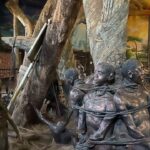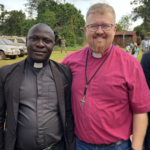
Is It the End of the World? A Christian Perspective on Mark 13 and the Future
A Sermon by Bishop Dr. Jonathan G. Smith
Sunday, Nov. 17, 2024
Lectionary Readings: Mark 13:1-8; Hebrews 10:11-25
Location: Redeemer Church Casselberry

WHAT IS THE CHRISTIAN OUTLOOK OF THE FUTURE? Is it pessimistic, predicting that it will only get worse, or optimistic, predicting that it will get better?
This question is so central to our outlook on life that how we live hinges on what we believe is the answer.
This morning, I am raising this question because our Gospel reading from Mark 13 could be read from one of these possibilities.
So I want to share with you why I have a very optimistic view and how I came to this place.
But before I do, I want to share with you a perspective from my life’s journey, then look at the text, and then conclude with some observations for how to go forward.
Is it the end of the world?
In the 80’s, a band named REM released a song in 1987, “It’s the End of the World as We Know It (And I Feel Fine).” The refrain of the song is the title, and the song repeats the phrase over and over again. But it didn’t grow in popularity until the mid-90s, when my generation was coming of age.
The writer allegedly based the song on dreams he had about, you guessed it, the end of the world.
Like dreams, the lyrics themselves seem disorganized. They randomly assemble people and phrases that somehow coalesce around the refrain but at times seem disconnected.
It’s the end of the world as we know it. And I feel fine.
I wouldn’t be telling you any of this unless one word hadn’t appeared during the song: rapture.
That word is particular to a form of Christianity popularized in the 1970 book The Late Great Planet Earth by Hal Lindsey. In the book, Lindsey outlined an end-of-the-world scenario based on a poor reading of several Bible texts, including a rather dubious reading of The Revelation of St. John.
It is still very popular among some Christians, particularly in more fundamentalist circles.
It popularized the idea of an event called “The Rapture.” If you’ve spent any time watching Christian television or spent time in Baptist or charismatic churches, then you may be familiar with the concept.
The gist of rapture theology is that the world is going to get really bad, and just before Satan takes over everything, Jesus will come and rapture or take every Christian away to heaven. Then God’s judgment will take place for seven years, the antichrist will appear, and then Jesus will come again, conquer it all, and usher in a new heaven and earth.
This world and everything in it will burn.
Lindsey’s views are not unique, but he certainly brought them into the mainstream. Almost thirty years later, Tim Lahaye and Jerry B. Jenkins released a series of novels based on Rapture Theology, Left Behind, that fictionalized how it could all potentially happen. Please hear me clearly; they are works of fiction.
The trouble with Lindsay, Lahaye, and many others is that their views are entirely unorthodox. They are a product of American fundamentalism dating back to the mid-19th century. Before this time period, you could not find this view in any major church figures.
I was taught this theology, and so were many of my friends. However, it is unbiblical and, in my opinion, has contributed significantly to the decline of Christianity.
Rapture theology is a pessimistic theology that leads to a form of escapism: “Jesus, come rapture us from our misery.”
Space Cowboys and Sonic Booms
I had to come to terms with this when I was a boy.
Many of you remember when NASA’s Space Shuttle program was in operation. For years, after the shuttle completed its mission in space, it would land in Texas and fly back to Cape Kennedy on top of a Boeing 747 Jumbo Jet.
Then, sometime in the late 1980s, they began landing the shuttles at Patrick Air Force Base. Each time the shuttle flew over our area, it traveled faster than the speed of sound, resulting in a sonic boom.
One day, after being heavily discipled by Rapture Theology, the space shuttle flew over our area in the morning, resulting in a sonic boom felt around the area. I was still asleep in bed when the boom went off. It startled me out of bed, and the first thing I thought was that Jesus had come back and that I had been “left behind.”
I was so startled and terrified by the thought that I raced into my parents’ room, only to find the bed empty and unmade—something my mother would never allow. I then ran around the house, utterly terrified for an instant, only to discover my dad on the outside porch. When I saw him, a wave of relief came over me, but then doubt, he may have been left too.
My mom finally appeared and I thought, nah. We’re good.
I was left so disturbed by that moment.
In my childlike way of thinking, I asked myself, “Is this what I have to live with the rest of my life?” This question was like a pinprick, leading me down a long path of questioning and deconstructing what I had been taught.
I share all of this with you this morning because our bible readings contain a prophecy from Jesus to his disciples that appears in all of the synoptic gospels: the destruction of the Jewish Temple, which eventually occurred in AD. 70.
The problem is, however, that these passages are often misused by many to argue for the destruction of the world in the future. And when you factor in all of the challenges in our society today, it is often very easy to confuse the words of Jesus to his disciples with the current events of the day.
So before we go any further, we should ask ourselves a question. What’s the big idea here in Mark 13:1-8 and why should it matter to me today?
The answer is to discover what the Lord Jesus was saying to his disciples and then, as followers of the Way, understand what it means for us today
So lets make several observations from Mark 13: 1-8.
First, the disciples’ focus was on the wrong things.
Human beings are attracted to beautiful, sacred buildings.
Several years ago, I was taken on a tour of brand new worship space built from an old big box store. The church had completely remodeled the space in a modern, contemporary style that blended vintage pieces throughout the interior. It really was a beautiful space.
As we toured the facility, the pastor made a statement that took me back for a moment. He said, “Yeah, I really like how it turned out. But it doesn’t matter because, in the end, I know it will all burn.”
There was some truth to what he was saying.
Europe and America are riddled with old church buildings that have been torn down or replaced altogether. So, when people become attached to buildings, they can at times impede the proclamation of the gospel, particularly when the leadership of the church it represents has veered from the historic faith.
However, buildings are visible signs and symbols of the historic faith. So when they fall into disrepair or the ministry no longer reflects for what it stands for, then they become nothing but ruins of the community that they once housed.
The Jerusalem temple fell into a similar situation. It was supposed to be the house of God but it had turned into a den of thieves.
Mark 13:1-2 is an indictment against the Jewish Temple.
When the disciples walked past the building, marveling at its magnificence, Jesus warns in verse 2:
Jesus said to him, “Do you see these great buildings? Not one stone will be left upon another—all will be thrown down.”
Jesus is not an iconoclast, meaning he wasn’t against symbols or sacred spaces. Rather, Jesus understood that the temple, as a symbol, represented an age, a time that was about to end, because a new age, the age of the Kingdom of God was about to be inaugurated in the crucifixion, resurrection, and ascension of Jesus.
Second, Jesus shared all of these things to prepare his disciples for their ministry.
Imagine, for a moment, that our nation’s capital building was completely destroyed. How would you react?
Now imagine if I prophesied that our nation’s capital building would be destroyed; what kind of tension would that create in you?
I imagine that similar reactions were taking place among the disciples as they were listening to Jesus’ words.
But Jesus’ intention was not to alarm them but to prepare them for what they would encounter in their ministry as apostles.
During the time of Christ’s ministry, there was significant political tension taking place in Judea. We know this because of the writings of Philo and Josephus, both Jewish historians who were recording the events that were happening.
In verse 5, Jesus says that a “messiah” will come and say, “I am he.” In AD. 46, a man named Theudas, who claimed to be a messiah/liberator, led a Jewish revolt against the Roman empire.
Then, in the years AD. 66-70, the first Jewish Revolt took place against the Roman Procurator Floras, whose brutality and use of temple funds infuriated the Jews. The population rebelled against Rome, and the Roman Army came in and destroyed much of Jerusalem, including the Temple.
Jesus prophesied all of these events to prepare his disciples for ministry in a new age, the Kingdom of God. We live in that age now, a new reality of God’s rule and reign through his son Jesus.
The Old Temple, representing an old age and the old covenant, was now giving way to a new age with a new covenant and new temple and King.
That is why in our lesson from Hebrews this morning, we read of Jesus serving as a High Priest and now seated as a King at the right hand of the Father (vs. 12). God had no need for temple because a new and living temple had been erected, you and me.
To be clear, Jesus is now seated at the right hand of the father as both God and man and his kingdom extends over all the earth, here and now.
How, then, are we supposed to live in light of his rule and reign?
We are to live in victorious boldness as the people of God.
In St. Paul’s letter to Timothy, Paul writes these words to the young preacher:
For God has not given us a spirit of fear, but one of power, love, and sound judgment.
During Timothy’s ministry, he faced great uncertainty. Christianity was only a tiny movement, barely even noticeable to the Romans, and generally associated as a sect of Judaism.
With all of the chaos taking place in Judea, it was not popular to either be Jewish or even less popular to be a subsect of Judaism.
Yet Paul writes, in the face of such difficulties, he tells him to “Rekindle” the gift of God within himself.
That is my encouragement to you. In the face of all the chaos of this world, rekindle the gift of God within you. The Holy Spirit is that gift. And he has not given you a spirit of fear, but of power, love, and sound judgment.
I’m convinced that one of the weapons of the enemy is to convince Christians that this world isn’t worth saving. But when we surrender this world to Satan, then we’ve actually undermined Christ’s rule and reign.
In just a few minutes, we will be taking holy communion. In our liturgy, we’ve added a line that says, “To the King and his Kingdom; and to the victorious Lamb.”
That line speaks the reality we’re called to live under. Christ is victorious. Let us hold onto that truth as we go forth in life.




